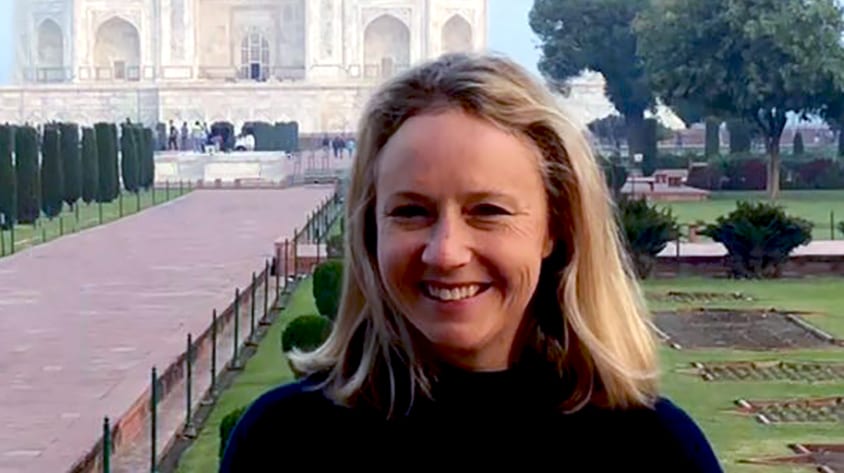 “As a freshman ECON major, I took an introductory Computer Science class because I had enjoyed CS classes in high school. At the end of my first lab, one of my professors asked if I needed tutoring,” said Annie Christian Klemp, Rice University alumna (B.A. ’04, M.C.S. ’05).
“As a freshman ECON major, I took an introductory Computer Science class because I had enjoyed CS classes in high school. At the end of my first lab, one of my professors asked if I needed tutoring,” said Annie Christian Klemp, Rice University alumna (B.A. ’04, M.C.S. ’05).
Klemp was a National Merit Scholar and one of the only female students in that class. The future Google director for business operations and strategy still remembers being surprised by the question.
“It felt like a challenge,” she said. “I politely declined the offer, but it also sparked something for me. It was just the incentive I needed to work hard and excel in the class. At the end of the semester, that same professor invited me to TA the class the next year.”
Klemp discovered her affinity for CS and signed up for a second COMP course, taught by Dr. Lydia Kavraki. By the end of that course, Klemp realized she enjoyed her CS courses more than Economics, and she changed her major.
She said, “My professor’s early challenge may have prompted my initial determination to succeed in my COMP classes, but what kept me in CS was Dr. Kavraki. She was an incredible role model, and she took a personal interest in me.
“Although I’d completed two AP CS courses in high school – even given up my spot on the tennis team to pursue the second class my senior year – this was the first time I felt someone really cared that I succeed in CS. Dr. Kavraki encouraged me to apply for a research scholarship, and I joined her bioinformatics team that summer.”
Kavraki’s interest and investment in Klemp’s success inspired her to remain in touch with her mentor throughout her career. Klemp said, “Dr. Kavraki has been so influential in the person I’ve become. I owe her a huge debt of gratitude.”
As one of the few women in the major, Klemp recognized the importance of a support system and helped co-found a club for women in computer science, “CSters,” to encourage other female students in the department.
“There were only four or five of us, but it was enough to make me feel like I belonged. It didn’t matter that there were few of us; we were a good group together, and the small number actually made us closer.
“Wendy Logan and Merziyah Poonawala helped co-found the club with me, and I became roommates with another CSters member, Tina Kim. Wendy, Tina, and I all headed Grace Hopper as juniors.”
Inspired by the conference’s more than 600 women pursuing technology degrees and careers, Klemp returned to her Rice CS courses with a new sense of purpose and enthusiasm. She continued working on Dr. Kavraki’s research team, realized her experience could be counted as graduate school credit, and decided to pursue a master’s degree.
She said, “Staying on for the M.C.S. degree was a no brainer. I had earned credit for my research and only needed a few more courses for the master’s. The advanced degree adds credibility when you are talking with CS professionals, and I really think Google took that into consideration as they evaluated my resume to determine if I might be a good fit.”
Good organizational fits and successful outcomes are best achieved by blending diverse personalities, cultures, and experiences, according to Klemp. She said it is important to involve women and underrepresented minorities in technology development, and she strives to be inclusive in her own teams.
“A lot of what I do at Google is to look at the next set of users coming online for the first time, to think about how we build for communities outside Silicon Valley. Developing products for use in a different country or culture should include having those community members on the build, even having them design their own solutions.
“No matter how much you think you understand, you don’t. Not really. Women need to be part of building solutions that will be used by women. If you don’t live it, you don’t get it. Our technology becomes better – our experiences become better – when we ensure a diverse representation in whatever we are doing.”
Klemp urges engineers who feel marginalized to find sponsors willing to provide advice on opportunities as well as guidance through tough times. She also advocates finding or creating communities of support.
She said, “Don’t get discouraged if most people don’t look like you. The community you find or create doesn’t have to be the same gender or same culture. Find people with similar interests–that’s how you survive day to day. Your shared experience is what binds you together; you all have each other’s back.”
Annie Christian Klemp earned her B.A. in Computer Science in 2004 and her Master’s of Computer Science (M.C.S.) degree in 2005.